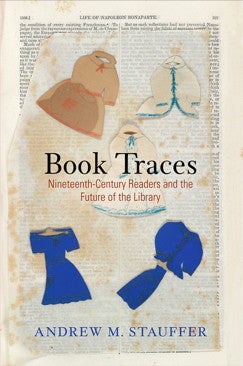Our speakers write:
We will introduce the Book Traces project (http://booktraces.org), which supports the discovery, cataloguing, and preservation of pre-1923 library books that bear traces of the past: inscriptions, annotations, insertions, and other modifications made by historical readers. Focused on “medium-rare” circulating collections on academic and research library shelves, Book Traces has proven the prevalence of unique manuscript material in nineteenth-century printed books. Readers’ interventions demonstrate a wide range of variability across apparent “copies” of the same book: these historical traces make visible the meaningful variability and continued vitality of library print collections.
Uniquely-modified and marked books reveal the types of interaction that characterized the American reading experience in the nineteenth and early-twentieth centuries. In Book Traces books, we find strikeouts, emendations, additions, and augmentations that alter the volume at hand. Ultimately, common readers’ interventions in their books illuminate the social constitution of texts and the ongoing evolution of books and their contents across time. Our goals now are to find these unique copies in the library stacks, edit their catalog records to make them discoverable, and to preserve them for future research. At the same time, Book Traces offers opportunities for student engagement and hands-on pedagogy involving book history, the nature of library print collections, and the past, present, and future of annotation.
About our speakers:
Andrew Stauffer is Professor of English at the University of Virginia, where he specializes in Romantic and Victorian poetry and book history. He is the author most recently of Book Traces: Nineteenth-Century Readers and the Future of the Library (2021), published in the Penn Material Texts series, and co-author (with the Multigraph Collective) of Interacting with Print: Elements of Reading in the Era of Print Saturation (Chicago, 2018). He has taught for the Rare Book School and is the President of the Byron Society of America.
Dr. Amanda Licastro (she/her) is the Emerging and Digital Literacy Designer at the University of Pennsylvania, the pedagogical director of the Book Traces project, and serves on the editorial collective of the Journal of Interactive Technology and Pedagogy. Her research explores the intersection of technology and writing, including book history, dystopian literature, and digital humanities. Her collection, Composition and Big Data, co-edited with Ben Miller, was published by the University of Pittsburgh Press in September 2021.




